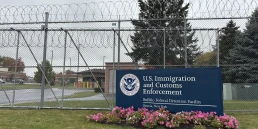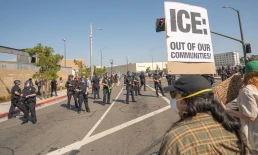This year ICE has sent more immigrant children into the federal shelter system than in the previous four years combined. New data suggests families are being separated.
By Mica Rosenberg, Mario Ariza, McKenzie Funk, Jeff Ernsthausen and Gabriel Sandoval, ProPublica
It was Friday, June 6, and the rent was due. As soon as she finished an errand, Imelda Carreto planned on joining her family as they gathered scrap metal to earn a little extra cash. Her fiancé, Julio Matias, and 15-year-old nephew, Carlos, had set out early, hitching a trailer to the back of their beat-up gray truck.
Shortly after 8 a.m., Carreto’s phone rang. It was Carlos, telling her an officer with the Florida Highway Patrol had pulled over the truck on Interstate 4 near Tampa. The stated reason: cracks in their windshield. But Carreto was worried. She knew Florida police were collaborating with federal immigration authorities. Her fiancé was undocumented. She says she rushed to the scene and made it there just before the immigration officers.

As she feared, Matias had been detained. But to her surprise, so had Carlos. He was just a kid. (ProPublica is only identifying Carlos by his first name because he is a minor.) Carlos was in high school. He’d been living in the United States for over two years and was working toward applying for legal status to stay long term. The government had given her, a legal resident, custody of him. Now he was in handcuffs. Why would they take him too?
Carreto didn’t carry any proof that she had custody of the boy. She had left it in another car in her rush. She recalls officers saying her nephew would likely be released to her in a few days once she presented the proper documents. Before they drove him away, Carlos started to tear up. Carreto told him, “Don’t cry. I don’t know how, but I’ll get you back. Understand?”
A cracked windshield, a waiting officer, a forgotten document: The new family separations often start in the most mundane ways.
Recent Posts
Trump’s Back-and-Forth Threats on Iran Are Psychological Warfare
January 31, 2026
Take Action NowAs Trump threatens Iran yet again, Congress continues to abdicate its responsibility to rein in war.By Hanieh Jodat, Truthout As…
U.S. Media Keen on Iranian Unrest—Less So on U.S. and Israel’s Role in It
January 30, 2026
Take Action Now Democrats have a rare moment of leverage to pass legislation ending qualified immunity for Immigration and Customs Enforcement…
The Senate Must Not Fund ICE, A Zero Hour Conversation With Sonali Kolhatkar
January 30, 2026
Take Action Now “We’ve seen a really sharp change in how the public views immigration enforcement, particularly ice, to the point where…
How Democrats Can End Qualified Immunity for ICE Agents
January 28, 2026
Take Action Now Democrats have a rare moment of leverage to pass legislation ending qualified immunity for Immigration and Customs Enforcement…




